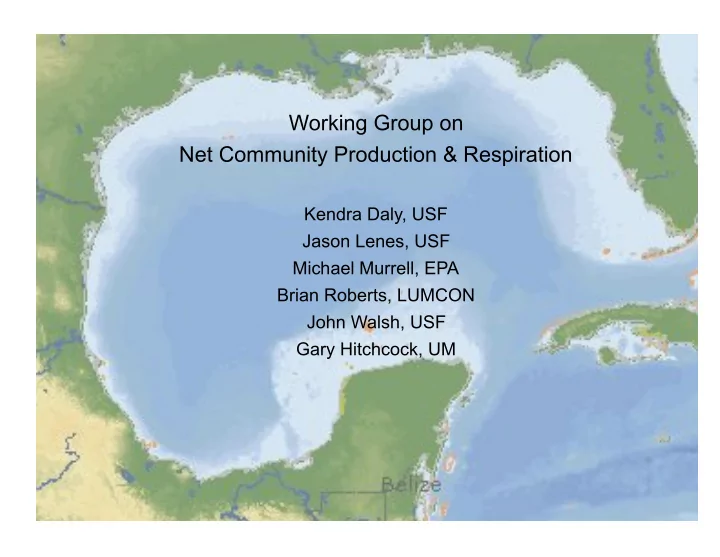

Working Group on Net Community Production & Respiration Kendra Daly, USF Jason Lenes, USF Michael Murrell, EPA Brian Roberts, LUMCON John Walsh, USF Gary Hitchcock, UM
Estuaries Shelf Oligotrophic
DEFINITIONS GPP = Gross primary production (all autotrophs) R com = community respiration (autotrophs + heterotrophs) NCP = GPP – R com NCP ≈ NPP – R heterotrophs If NCP < 0, heterotrophic metabolic state allochthonous C source CO 2 source If NCP > 0, autotrophic metabolic state autochthonous C source CO 2 sink
CO 2 GPP = ∫ Net Com Prod + ∫ R com R com NCP CO 2 NCP pycnocline depth R σ Estuary Stratified Shelf & Open Gulf
Estuaries: Open Water O 2 Method Δ O 2 = (GPP – R) + Advection + (Air Sea Exchange)
Estuary Comparison: open water method National Estuarine Research Reserve (Caffrey, 2003, 2004) Eastern Gulf of Mexico estuaries: Limited seasonality in GPP, R com � SE estuaries are heterotrophic almost year-round � heterotrophy Southernmost estuaries have higher R com than temperate waters � Location (marsh, mangroves) and freshwater input (FWI) are determinants of metabolism
Western Gulf of Mexico: Texas estuaries heterotrophy autotrophy Estuarine gradient in precipitation, freshwater inflows High GPP rates, balanced by high R com Spatial variability measured for correspondence of GPP, R Win Spr Sum Fall Russell, M.J., and P. A. Montagna. 2007. Spatial and Temporal Variability and Drivers of Net Ecosystem Metabolism in Western Gulf of Mexico Estuaries.
Gulf of Mexico Shelf Mississippi River: SW Pass Plume and Atchafalaya River Green et al., 2006
Combined biological & physical models Inverse and physical model: : Heterotrophic in winter (entire plume) Spring to summer: autotrophic, progresses from SW Pass to west Summer: NEM autotrophic with highest rates near SW Pass Bacteria dominate plankton R in winter. Breed et al. 2004; Green et al., 2008
Murrell et al. 2013 Guo et al. (2012) NCP from inorganic C mass balance model of plume NCP maximum at salinity of 18 – 27 NCP rates of 1 – 9 g C m -2 d -1 ; global maxima for river plumes Higher rates in spring-summer
Highest GPP, R com at < 30 m spring, summer R com in surface > bottom waters R com decreases east to west LA Shelf heterotrophic in west, offshore waters likely fueled by Miss River Org-C Murrell et al. (2013)
Brian Roberts: LUMCON Atchafalaya River, 30% of MARS flow F1 B. Roberts - LUMCON C3 F2A C6C C9 F5 C transect F transect mmol O 2 m -3 d -1 Variable seasonal patterns of R com , NCP Maximum R com near rAR mouth, in surface waters, declines offshore R com proportional to DIN uptake
West Florida Shelf: HABSIM Schematic of Carbon Flows
West Florida Shelf (NCP, R com ) Wanninkhof et al. (2007) Hitchcock et al (2000) Spring 2007 FSLE Declining plankton ‘bloom’ 18 O 2 GPP ≈ R com West Florida Shelf (NCP, R) Karenia brevis - Hitchcock et al (2010; submit.) 2006 Bloom indicates K. brevis autotrophic No ‘seasonal’ progression of auto to heterotrophic Dense populations may be net heterotrophic
Open Gulf Waters: Few NCP observations, low R com Biddanda Benner 1997 Pomeroy et al., 1995 Few observations in oligotrophic GOM R com in surface are relatively low Pomeroy ‘95 Current debate on metabolic state of oligotrophic waters
Group Summary: GOM estuaries are predominantly heterotrophic, CO 2 source to atmosphere (Cai, 2010) Mississippi River Plume best characterized of all regions; intermediate salinity waters are autotrophic GOM Shelf and oligotrophic waters under-sampled Quantify NCP linkage to riverine nutrient and carbon sources, N fixation in open Gulf
Recommend
More recommend